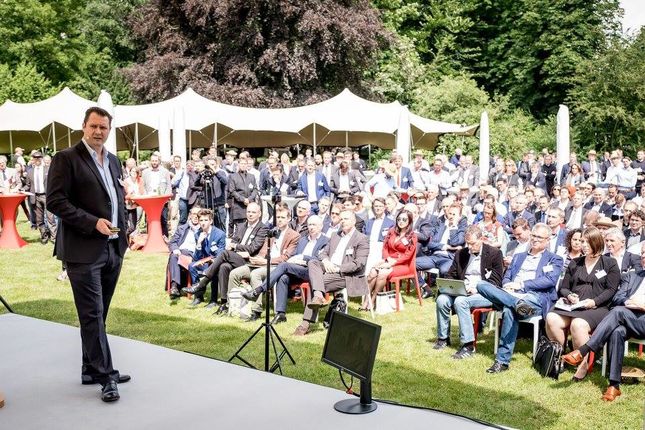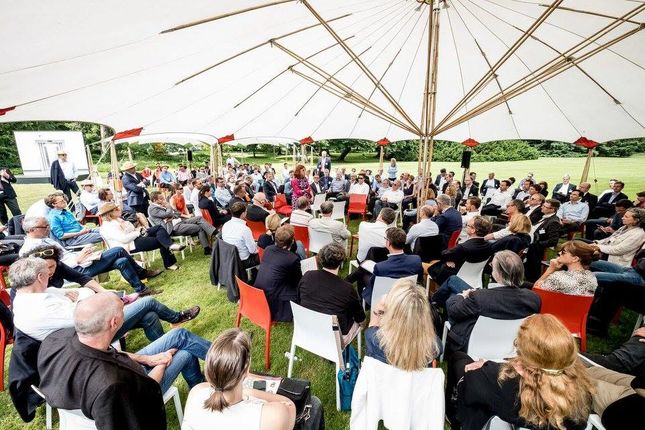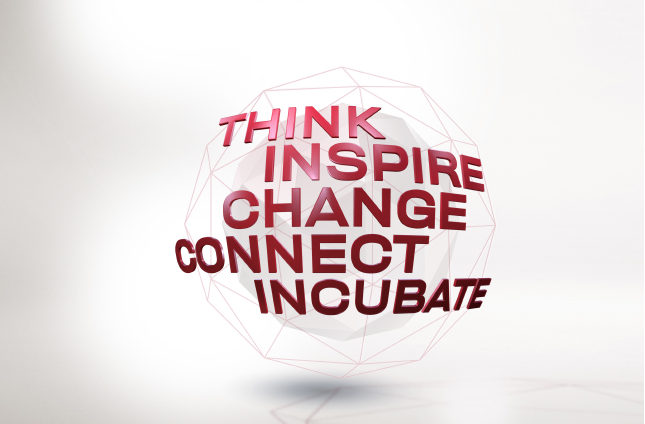Topics and Session Formats for the Future Conference

Think Quantum – The Prediction of Everything
How predictive enterprises will revolutionize our customers, products, and processes
The topics of digitalization have dominated discussions in the public and private sectors for the last ten years. From MP3 to HoloLens, from the 3D-printing of houses and human hearts, the 2b AHEAD ThinkTank has consistently and accurately predicted how digitalization will change industries across the board. Implementing these changes in practice is also sure to keep corporate strategists occupied for years to come. The real visionaries, however, are already looking to the times after the digital revolution. What can we expect in the year 2027? What will our processes look like in ten years? How will our customers tick? And how will we live ourselves?
The answers are based on a new understanding of the collection, analysis, and evaluation of data. While today's digital and omnichannel business strategies depend on the evaluation of real-time data, within the next few years they will need to become "faster than real time." Tomorrow's predictive enterprises will function on the basis of intelligent predictive operating systems. These systems will be capable of predicting the near future, and will steer all company processes on the basis of these predictions.
How the “Prediction of Everything” will revolutionize our customers, products, and processes
The 16th Future Congress of the 2b AHEAD ThinkTank will put a real hack on your conception of today’s world. Forget what you know about Industry 4.0, marketing, nation states, or your identity as a citizen. Discover where emerging predictive models will take us through 2027: How disruptive technologies will penetrate our industries! How marketing will have to be completely reimagined! How products will become predictive! What new customer segments will open to you! And: What structures and processes will look like in predictive companies!
Our Future Congress will put the consequences of data-driven business, data-driven companies, and data-driven life in focus: In what ways will human beings become part of the operating system of life in 2027? Will computers make the better bosses? Will learning AI programming skills become a social responsibility? In the world of predictive superanalytical systems, what decisions will we still make? And how?
Think Quantum!
The Future Congress will discuss the technologies that will shape our world over the next ten years. It will provide a snapshot of the future, showing how your customers, products, and company will change in these times of major disruption. It will present the best cases of agile companies from across the globe, and will discuss the most important question for our futures: How can people and companies successfully think predictively, be data-driven, and become part of the predictive system themselves?
Keynotes 2017

Personalised Marketing in the Age of Big Data
Presented by the Chief Operating Officer of Cambridge Analytica, this Key Note presentation will explore how Big Data and Psychographics can be used to enhance the personalisation of marketing campaigns. Leading edge advances in data science, digital marketing and targeted TV, now allow marketers to get to know you personally. Today it is normal for you to be served ads based on your online preferences and interests; in the future, these ads will also be informed by insight into your attitudes, lifestyle habits, values and other behavioural drivers. Speaking with experience from operating data driven campaigns around the world, this key note presentation will give you an insight into the true future of marketing.
The cultural and organizational skill set requirements for transforming into a digital Business
Every industry will be transformed by the new business models and revolutionary possibilities created by digital society in the 21st century. This raises a bunch of questions: What are the critical success factors that leaders must embrace when transforming an enterprise into a player for the digital age? What is the importance of data-driven business models to transform from traditional customer relationship management to customer experience management in the new world of digitally enabled customers? Stephen Brobst presents his answers and will emphasize the importance of real-time recommendation engines leveraging operational intelligence using self-learning algorithms with techniques drawn from the world of artificial intelligence and machine learning. You will learn an approach for monetizing data as a critical success factor for all enterprises who want to be successful in the digital age.
The Big Picture
This keynote will provide a picture of business in the year 2027, and will explain how living environments and business models will change.
The Other Side of the Singularity – How Brain Uploading Will Work
What will humans do when we are demoted to being the second most intelligent species on earth? Initiative 2045, founded by Russian oligarch Dmitry Itskov, examines the future of human life on earth after the point when computers have surpassed human intelligence. What tasks will humans take on in the future, and what will be our part in the operating system of the world? Why not try a brain upload? Substrate independent minds are systems whereby mechanisms of the human mind are translated into computer languages and uploaded to a computer. Should such a replica of the human mind be possible, then humans could theoretically live on forever in the virtual world – or survive in bodiless form in hostile environments, such as on space missions to distant parts of the universe.
Th!nk Quantum – How Quantum Computers Will Revolutionize Our World
The steam engine. The railway. Electricity. The automobile. Penicillin. Atomic energy. Computers. The internet. They have all changed the world – and with it, business as well. The next big revolution will be quantum computers.
The computing power of these computers will dwarf everything we have ever seen. They will be capable of analyzing extremely complex situations and accurately predicting future outcomes. This is why it’s no wonder that Google’s algorithm experts, IBM’s Watson developers, and the cryptography geniuses at the NSA are scrambling for first place in the race to develop quantum computers. These machines, however, will mean fundamental changes not only to our markets, but to our living and working environments as well. And they will open up a new universe of possibilities for tomorrow’s business models.
This keynote will reveal what the world will look like in 2027, when quantum computers have become part of everyday life. What will this mean for your life, your work, and your leadership skillset?
Predictive Politics
Do predictive analytics have the potential to change the way politicians think? All across the globe, political systems are undergoing radical change. With Trump's electoral victory alone (and despite its dramatics) a fundamental shift in political thinking has made itself known. Trump largely owes his victory to a previously unheard-of precision in its approach to the individual voter – Cambridge Analytica is setting new standards for the possible.
Predictive analytics, applied to the political and social spheres, takes the precision of interpreting the will of the people to an entirely new level: timely, conceptually, highly differentiated. What will governments be able to do when they not only parrot the opinions of the people, but know what these are well in advance? And not only what the public will say, but also what it will want – on election day, but also every other day of the year? Technology is opening an entirely new dimension of political action: the future dimension. The quality of political governance will thus become quantifiable, even beyond the lifetime of legislation. What decision today will best meet the needs of the people – from a future perspective as well?
Michael Carl, Research Director of the 2b AHEAD ThinkTank, provides a portrait of our society when algorithms have made predictive politics and predictive governance a reality.
Panels 2017

Welcome address and opening panel: Future Vision – Technology 2027
The tech roadmaps of the next ten years
In the years of digitalization, technology has become the most important driver for economic and social development. It is changing everyday life more and more rapidly. While we imagine a linear path forward for ourselves and our companies, actual developments are unfolding at an exponential rate – the margin of error between our own predictions and reality is becoming increasingly larger. Those who are able to let go of their biased predictions and view the unpredictable as an opportunity rather than a threat will be the winners in tomorrow's business. For everyone else, this dynamic will lead to the worst-case scenario. Better to be among the prepared!
Congress host and noted futurist Sven Gábor Jánszky will greet his guests and introduce the various aspects of the congress program with reference to his own analysis. This panel will unveil the technology roadmaps of various key industries through 2027. The strategy and technology heads of major German and international corporations will debate the question of how we can successfully adapt our business models over the next ten years.
StrategyArena: Future Vision – Customer Needs 2027 Intimate AI: How Will Customer Analysis and Marketing Change When AI Knows You Better Than Your Spouse Does?
"Customers who bought this item also bought…“ This is how online retailers like Amazon have long worked to generate additional profit from our user behavior – the result is sometimes helpful, but often merely annoying. These rather primitive marketing approaches from the early digital age, however, are on the way out. We can even safely lay aside the customer segmentation of the pre-real-time era à la Sinus Milieu and his generation of thinkers. And even the omnichannel strategies that have recently become a priority are only a fraction of the answer to the challenges that the predictive era will bring for marketing and market research.
Today's digitalization of customer interfaces with the aim of pitching the company product on as many digital channels as possible is not an answer to the questions of a radical future. Because the question of who will be the winners and losers in this transformation will be decided elsewhere – there, where real-time data about the personal interests and current behavior of the customer is generated and analyzed to adapt products and services to situational and highly personalized customer needs. This is the world of adaptive products. Your predictive system will need to be capable of accurately anticipating and predicting where the needs of your customers will change. This kind of self-learning system will constantly improve itself in believably interpreting these needs. Not only customer needs can be analyzed here, however. Your customer's preferred style of speaking, outlook and ways of thinking, and even their personal psychological profile may also be just as important. What would your marketing look like if you knew how every single one of your customers ticked and what approach their psyche reacts to best? What competencies and strategies will market research need in order to remain relevant for this future business model? How will your customers' lives change when they are addressed more and more subjectively by commerce? Will there even by generalizable customer segments for the predictive era? If so, what will they look like?
StrategyArena: Future Vision – Leadership Strategies 2027
AI that Leads: How Can We Learn to Perceive AIs as our Colleagues ... or Our Bosses?
Machines and robots have made life more comfortable. They can do jobs that would be too dangerous for humans or that would demand superhuman abilities – be it strength, speed, or precision. Jobs we don't miss doing. We will soon experience the same thing with artificial intelligence.
The AI in your life will make decisions whose full effects you will not be capable of grasping. It will ask critical questions that you will find personally enriching. It will know what is occupying you at the moment, what beliefs and attitudes you have. It will be capable of accurately assessing the capabilities and personal characteristics of your employees and will autonomously put them where they are most needed at a given time. And they will constantly improve in all these areas and learn new things on their own.
In short: Self-learning intelligences will acquire leadership skills, which sets them apart from machines and robots. It is time for a detailed look at human-digital teams: How will team development work? What leadership guidelines will AI need?
StrategyArena: Future Vision – Products 2027
How will predictive enterprises change your products?
Predictive systems will kill your standard products. Because the more precisely you know your customers, the more they will see that your products and services have been individually adapted to them – and to their real-time needs. The products of the future will be adaptive, changing themselves autonomously and intelligently to fit every situation and stage of life. And they will be self-learning. By 2027, quantum-computing intelligence will not only be a standard feature of your smart phone, but will also interface and interconnect with all sensor-equipped products. But how will the production of these self-learning products work? What unintelligent products will we still need tomorrow? How can product and data security be guaranteed when no standardized products are left?
StrategyArena: Future Vision – Society 2027
Superhuman Intelligence: How Will Computers Learn to Make Decisions?
Even today, there are already decisions that computers are better at making than humans: What is the best move in this game of Go? What is the optimal route for avoiding today’s morning traffic? At the same time, our world is becoming increasingly complicated. For most decisions made by companies today, the consequences are too complex for humans to fully identify or predict. But before AIs can make these complicated decisions for us, they have to be told what value system their decisions should be based on. Who will teach humanity to machines, and how? Who decides what is considered right or wrong? Microsoft’s chatbot Tay has recently demonstrated how many unsolved problems are ahead of us. In a limited environment, Tay became – or better, was transformed into – a racist. The company’s new chatbot Zo, in contrast, has been programmed to keep silent about controversial subjects. But is a digital muzzle really the right solution? Wouldn’t it actually be better to view computer learning as our collective responsibility, a kind of socialization process? Will the singularity lead to equality between machines and human beings? Will we all need to take part in teaching intelligent computers to be more human?
VisionTalks

Thinking quantum – The big visions
Cars that fly? Meat can work without animals? Robots fight for their right to exist, and grandpa gets his own chatware so that we can write him after he's passed away? Impossible! Or is it? Here big visions aren't despised, but in demand! In short but striking talks, scientists, inventors, and startup founders explain how they plan to change the world. Lunatic ... or visionary? You decide. Join us for a trip into the impossible. Think bigger – think quantum!
Elevator Pitch
![Elevator Pitcher [Translate to Englisch:] Elevator Pitcher Zukunftskongress 2016](https://conference.future.consulting/fileadmin/_processed_/b/d/csm_2b_AHEAD_Zukunftskongress_2016_Elevator_Pitcher_913ae0eb59.jpg)
Five hand-picked founders of successful organizations will present their business ideas competitively at the elevator pitch. Each has exactly two minutes to convince the audience of the merits of his or her business model. An expert jury will rate the pitches. The best one will then be presented with the 2b AHEAD Future Award that evening. Additionally, congress participants and venture capitalists will be given the opportunity to meet with the presenters. The business models pitched at the congress will be selected using a nationwide invitation among entrepreneurial initiatives.
Business Speed Dating
![Business Speeddating [Translate to Englisch:] Das Business Speeddating beim 16. Zukunftskongress](https://conference.future.consulting/fileadmin/_processed_/e/3/csm_2b_AHEAD_15._Zukunftskongress_2016_Business_Speeddating_ceaf463648.jpg)
In business speed dating, congress participants get to know each other in relaxed but compact conversations over coffee. In 30 minutes, you will get to know 15 interesting people, including potential customers and business partners. This short and intense conversation format will give you an overview of the congress participants that are of interest to you.
For a predictive matching, four weeks in advance of the congress the 2b AHEAD organizing team will speak with every participant. Based on the answers given concerning current questions, projects, and expertise, we will arrange the most promising constellations for business speed dating. Use these introductions as a foundation for deepening conversations later during the congress. Don't forget to bring plenty of business cards!
Agenda and Program Flyer
Below you will find the program for the 16th Future Congress of the 2b AHEAD ThinkTank on June 20-21, 2017 at Wolfsburg Castle in Wolfsburg, Germany.
The program flyer is available here.




